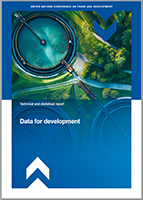
At a time when digital connectivity defines our lives, the importance of data in shaping the trajectory of global development cannot be understated. As economies and societies become increasingly interwoven with digital technologies, data emerge not only as an asset but as a catalyst for transformative change. While data-driven insights harbour the potential to spur innovations and foster sustainable development, the pathway is riddled with both unparalleled prospects and formidable challenges.
This publication seeks to unravel the multifaceted relationship between data and sustainable development, probing into its vast potential and the inherent risks, especially in the context of the 2030 Sustainable Development Agenda. Through an in-depth exploration of relevant literature and country case studies contributed by the members of the United Nations Commission on Science and Technology for Development (CSTD) and international organizations, we aim to offer a comprehensive understanding of how nations, both developed and developing, can harness data as a formidable ally in their quest for sustainable progress.
In this publication, we uncover the channels through which data can invigorate developmental initiatives, streamline production systems, and champion evidence-informed policymaking-all of which culminate in the realization of the SDGs. Drawing from a rich tapestry of experiences- both from developed economies with advanced data infrastructures and developing nations embarking on their data-driven journeys-we spotlight invaluable lessons and best practices. These narratives not only serve as beacons of success but also offer replicable models for nations worldwide.
In addition to examining the potential of data in driving sustainable development, this publication unpacks the intricate challenges that public and private sectors encounter in maximizing the benefits from data utilization. It emphasizes the pivotal role of data quality, robust infrastructure, and rigorous cybersecurity, underscoring the urgency for international standards that ensure data's integrity and security.
The rise of systemic issues, including stifled market competition and ethical dilemmas stemming from data misuse, is brought to the fore. The publication examines the impact of data-centric business models, such as digital platforms, elucidating their propensity to engender imbalances in labor markets, market competition, and consumption patterns. By shedding light on the multifaceted nature of data-related challenges, this publication aims to stimulate informed discussions and catalyse strategic initiatives to bolster both effective and ethical data utilization.
To advance data governance for development, the publication proposes seven global data governance principles, consistent with the imperatives of multilateralism, multi-stakeholder approach and multidisciplinary consideration of data.
The publication is structured as follows:
The first three sections lay the foundation by exploring the nature of data (Section II), promises of data for sustainable development (Section III) and the associated challenges (Section IV).
Section V examines the capacities of governments to benefit from data and address associated challenges.
Section VI delves into data governance, focusing on three pivotal areas: global data governance, data taxonomies, and the social contract for data governance. It concludes by presenting seven principles of global data governance.
Section VII concludes with recommendations and conclusions for the review of governments and the international community.


